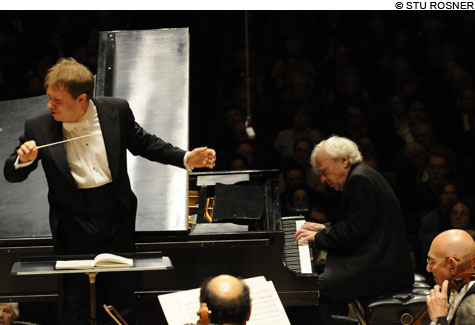
MIX MASTER Conductor Ludovic Morlot made a coherent — and exciting — concert of the BSO’s extremely varied program. |
Former BSO assistant conductor Ludovic Morlot has returned for two programs planned by and for former music director James Levine. Morlot, now music director of the Seattle Symphony and about to become chief conductor of Brussels's La Monnaie theater, last weekend led a kaleidoscopic yet coherent concert that included Berlioz's gorgeous and exhilarating Roman Carnival Overture, Mozart's Piano Concerto in C (with Richard Goode), Elliott Carter's 2008 Flute Concerto (with BSO principal flute Elizabeth Rowe — a BSO co-commission, completed in 2008, Carter's 100th year), and the ferocious and lubricious suite from Bartók's surreal theatrical pantomime, The Miraculous Mandarin. I felt reassured even before the concert began: for the first time all season, first and second violins were on opposite sides of the stage, just as maestro Levine (and surely the composers themselves) had wanted them.In the stunning Berlioz — brilliant and fresh and flexible and clear — you could hear everything, each new climax building upon the last. Robert Sheena's luscious English horn solo, one of the great Berlioz melodies, sounded as if (like Morlot) he were discovering the beauties of Berlioz as he was articulating them. The grand trumpet-and-drums Mozart was lovely if understated, the keyboard too dainty, the phrasing unpointed, even in the innocent yet knowing finale.
Was it the bad weather or the modern music that triggered a post-intermission exodus? Those who left missed Carter's scintillating concerto, with Rowe repeating her superb American-premiere performance. The concerto begins with a brassy blurt and feels like a youthfully uninhibited work until the long, slow elegiac nocturne marked Mesto ("Mournful"). No one writes more moving slow movements than Carter. Orchestral outbursts try to interrupt the floating, long-lined, pure-toned flute, until the orchestra finally gives up and, listening, gives in. The Bartók begins with traffic noise, which Morlot brought to the level of apocalyptic frenzy. Next at the BSO, more Morlot: Harbison, Ravel, and Mahler.
People who heard countertenor Philippe Jaroussky in the Boston Early Music Festival production of Niobe, and people who wish they had, crowded into Emmanuel Church for his concert with Apollo's Fire, Cleveland's premiere period-instrument ensemble, under the tight and lively direction of harpsichordist Jeannette Sorrell. High male voices, usually castrati (because parents saw an opportunity to get rich on their sons' potential talent) were all the rage in the 17th and 18th centuries. Jaroussky is one of the rare countertenors today who arouses audiences to similar excitement with his phenomenal technique (ecstatic, endlessly suspended breaths; machine-gun runs, roulades, and trills), beauty — and size — of tone, eloquent expression, and elegant phrasing.
He floored us again in arias by Handel and Vivaldi. Sorrell designed the program to show that, although Vivaldi's vocal music is far less familiar to us than Handel's, much of it is just as beautiful. And based on what Jaroussky sang, Vivaldi was every bit as ravishing as Handel, though he wasn't quite as good a text setter, so the fireworks sometimes exploded in the "wrong" place. But fireworks there were! And an even more breathtaking quietude.
Sorrell interspersed the arias with Handel and Vivaldi instrumental pieces. Her positively demented improvisational arrangement of Vivaldi's setting of the famous song "La folia" (Madness) was greeted with almost the same rapture as Jaroussky. We were treated to three encores: arias by Porpora and Handel, ending with Handel's famous and sublime aria to a tree (!), "Ombra mai fu," from Xerxes. I haven't heard this sung as beautifully and sensitively since Lorraine Hunt Lieberson in the Boston Lyric Opera's 1996 production. Is higher praise possible?